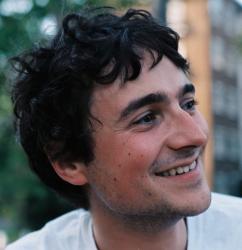We are all marked by those close to us, be they friends, relatives, or lovers, and it’s no surprise that many short films are structured as a tribute to a significant real-life relationship. But these films run a risk: in striving to honour the private quirks and emotions of that relationship, they can neglect to tell a story that’s meaningful to the public.
Guaxuma sidesteps this pitfall. In this wistful slice of autobiography, writer-director Nara Normande revisits her childhood, focusing on the years spent with her best friend Tayra. The pair grew up on the titular beach in northeast Brazil, a region familiar from Normande’s brilliant live-action short Heartless (which she co-directed with Tião). In a discursive voice-over, Normande describes the hippy commune that raised her, and the freedoms it gave her as a child. The delicate sound design by Normand Roger, animation composer extraordinaire, draws us deeper into her world.
Thus the film leaves us with a rich impression of the beach, which is a striking place in itself. It is also the setting in which the friendship with Tayra took root and blossomed, before being cut short by a tragedy. So as Normande gradually reveals that she lost first the beach, then Tayra, we feel the weight of her sadness. We also appreciate that the two ruptures are, in a sense, related: together, they spell the end of childhood.
The poetry of Normande’s narration is enhanced by her choice of media. She and her crew mix sand animation, stop-motion puppetry, photography and live action. They even use sand in various ways, including a form of sculpture that I haven’t seen in animation before. This virtuoso hybrid of techniques is never disorienting, as we are always grounded in the location of the beach, to which the sand is of course connected. (Ironically, Normande had to look to Europe for sand animators, as she couldn’t find any in Brazil.)
At the same time, sand denotes the passage of time and the elusiveness of memory. Early in the film, Normande confesses that her memories come to her from different sources, not all of them reliable. The shifts between techniques seem arbitrary at first, but I’ve decided that they signal different stages of remembrance, the abstract, idealised forms of the sand and puppets giving way to the immediacy of live action.
Guaxuma is experimental, polished, and moving; I rarely get to combine those adjectives. The film has picked up awards at prestigious festivals like SXSW and Palm Springs, and is in the running for an Oscar. For her next project, Normande is returning to live action and re-teaming with Tião. The pair are developing a feature, The Heron, which they will write and direct together. I can’t wait.

 Alex Dudok de Wit
Alex Dudok de Wit